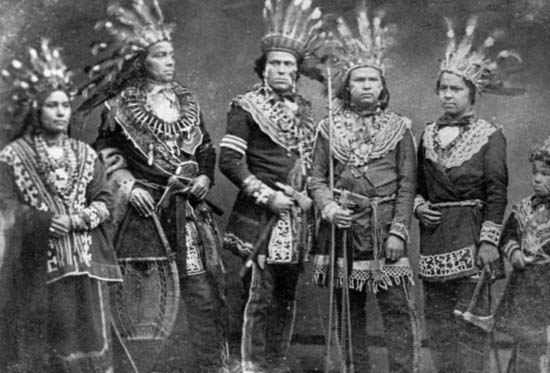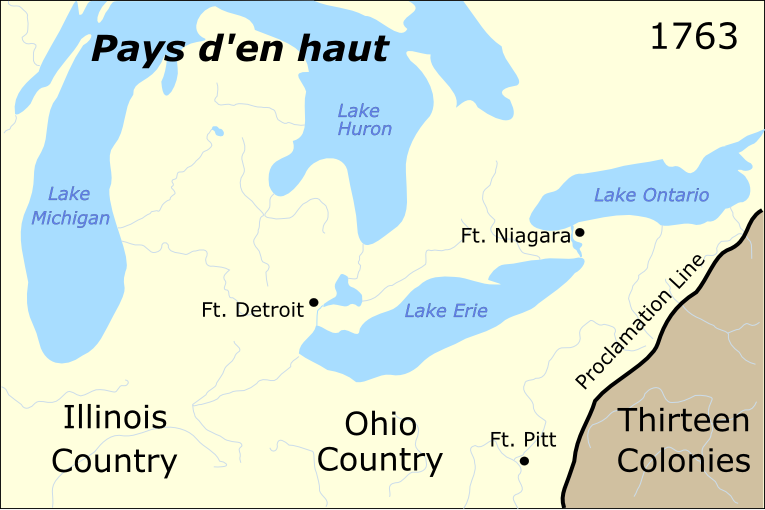|
Wasson
Wasson (c. 1730 – c. 1790s) was an Ojibwa chief during the siege of Fort Detroit in Pontiac's War. Wasson led around 200 warriors, who joined Pontiac's forces on May 31, 1763, remaining as part of the siege until it was abandoned in the autumn. On July 4, 1763, Wasson killed captive Captain Donald Campbell, in revenge for the death of his nephew. From the following year until at least 1776, Wasson participated in a series of peace conferences, and was the primary native speaker at John Bradstreet Major General John Bradstreet, born Jean-Baptiste Bradstreet (21 December 1714 – 25 September 1774) was a British Army officer during King George's War, the French and Indian War, and Pontiac's War. He was born in Annapolis Royal, Nova Scotia ...'s peace conference in September 1764. An Ojibwa chief of the same name was also involved in negotiations over land in 1790, but it is not certain whether this was the same person. ReferencesBiography at the ''Dictionary of Canadian Bi ... [...More Info...] [...Related Items...] OR: [Wikipedia] [Google] [Baidu] |
Siege Of Fort Detroit
The siege of Fort Detroit was an ultimately unsuccessful attempt by North American Indians to capture Fort Detroit during Pontiac's Rebellion. The siege was led primarily by Pontiac, an Ottawa chief and military leader. This rebellion would be one of the catalysts that hastened the declaration of the Proclamation of 1763 which would eventually precipitate the events leading to the American Revolution. Background Fort Detroit had been captured by the British during the French and Indian War following the Fall of Montreal in 1760. It was on territory ceded by France to Great Britain in the Treaty of Paris in 1763 and was garrisoned by a British force during Pontiac's Rebellion. Originally allied with the British forces due to promises of blankets, gunpowder, and rum among other valuables, a large force of 700 Native Americans—Ottawas, Pottawatomis, Hurons (Wyandots), and Chippewas (Ojibways)—watched as the fort changed hands on November 29, 1760, by French commander ... [...More Info...] [...Related Items...] OR: [Wikipedia] [Google] [Baidu] |
Donald Campbell (soldier)
Donald Campbell (died 4 July 1763) was a British officer in the Royal American Regiment killed during the siege of Fort Detroit in Pontiac's War. He was taken prisoner during a flag of truce, and later killed and dismembered by Ojibwa chief Wasson, who ate his heart. His remains were thrown into the river and were then picked up and buried at Fort Detroit Fort Pontchartrain du Détroit or Fort Detroit (1701–1796) was a fort established on the north bank of the Detroit River by the French officer Antoine de la Mothe Cadillac and the Italian Alphonse de Tonty in 1701. In the 18th century, Fre .... References * Year of birth missing 1763 deaths British people of Pontiac's War British military personnel killed in action Cannibalised people Royal American Regiment officers Scottish soldiers {{UK-army-bio-stub ... [...More Info...] [...Related Items...] OR: [Wikipedia] [Google] [Baidu] |
Ojibwa
The Ojibwe, Ojibwa, Chippewa, or Saulteaux are an Anishinaabe people in what is currently southern Canada, the northern Midwestern United States, and Northern Plains. According to the U.S. census, in the United States Ojibwe people are one of the largest tribal populations among Native American peoples. In Canada, they are the second-largest First Nations population, surpassed only by the Cree. They are one of the most numerous Indigenous Peoples north of the Rio Grande. The Ojibwe population is approximately 320,000 people, with 170,742 living in the United States , and approximately 160,000 living in Canada. In the United States, there are 77,940 mainline Ojibwe; 76,760 Saulteaux; and 8,770 Mississauga, organized in 125 bands. In Canada, they live from western Quebec to eastern British Columbia. The Ojibwe language is Anishinaabemowin, a branch of the Algonquian language family. They are part of the Council of Three Fires (which also include the Odawa and Potawatomi) and ... [...More Info...] [...Related Items...] OR: [Wikipedia] [Google] [Baidu] |
Pontiac's War
Pontiac's War (also known as Pontiac's Conspiracy or Pontiac's Rebellion) was launched in 1763 by a loose confederation of Native Americans dissatisfied with British rule in the Great Lakes region following the French and Indian War (1754–1763). Warriors from numerous nations joined in an effort to drive British soldiers and settlers out of the region. The war is named after Odawa leader Pontiac, the most prominent of many indigenous leaders in the conflict. The war began in May 1763 when Native Americans, alarmed by policies imposed by British General Jeffrey Amherst, attacked a number of British forts and settlements. Eight forts were destroyed, and hundreds of colonists were killed or captured, with many more fleeing the region. Hostilities came to an end after British Army expeditions in 1764 led to peace negotiations over the next two years. The Natives were unable to drive away the British, but the uprising prompted the British government to modify the policies that had ... [...More Info...] [...Related Items...] OR: [Wikipedia] [Google] [Baidu] |
Pontiac (person)
Pontiac or Obwaandi'eyaag (c. 1714/20 – April 20, 1769) was an Odawa war chief known for his role in the war named for him, from 1763 to 1766 leading Native Americans in an armed struggle against the British in the Great Lakes region due to, among other reasons, dissatisfaction with British policies. It followed the British victory in the French and Indian War, the American front of the Seven Years' War. Pontiac's importance in the war that bears his name has been debated. Nineteenth-century accounts portrayed him as the mastermind and leader of the revolt, but some subsequent scholars argued that his role had been exaggerated. Historians today generally view him as an important local leader who influenced a wider movement that he did not command. The war began in May 1763 when Pontiac and 300 followers attempted to take Fort Detroit by surprise. His plan foiled, Pontiac laid siege to the fort, where he was eventually joined by more than 900 warriors from a half-dozen tr ... [...More Info...] [...Related Items...] OR: [Wikipedia] [Google] [Baidu] |
John Bradstreet
Major General John Bradstreet, born Jean-Baptiste Bradstreet (21 December 1714 – 25 September 1774) was a British Army officer during King George's War, the French and Indian War, and Pontiac's War. He was born in Annapolis Royal, Nova Scotia to a British Army lieutenant and an Acadian mother. He also served as the Commodore-Governor for Newfoundland. Life Jean-Baptiste Bradstreet was the son of Agathe de Saint Etienne de La Tour and her first husband Edward Bradstreet. It is unknown whether he was related to Puritan Simon Bradstreet. Canadian National Biography, Retrieved 25 June 2016 Military service Through his Acadian mother's influence he was accepted into the regular British army in 1735. Bradstreet's early military service consisted o ...[...More Info...] [...Related Items...] OR: [Wikipedia] [Google] [Baidu] |
1730s Births
Year 173 ( CLXXIII) was a common year starting on Thursday (link will display the full calendar) of the Julian calendar. At the time, it was known as the Year of the Consulship of Severus and Pompeianus (or, less frequently, year 926 ''Ab urbe condita''). The denomination 173 for this year has been used since the early medieval period, when the Anno Domini calendar era became the prevalent method in Europe for naming years. Events By place Roman Empire * Gnaeus Claudius Severus and Tiberius Claudius Pompeianus become Roman Consuls. * Given control of the Eastern Empire, Avidius Cassius, the governor of Syria, crushes an insurrection of shepherds known as the Boukoloi. Births * Maximinus Thrax ("the Thracian"), Roman emperor (d. 238) * Mi Heng, Chinese writer and musician (d. 198) Deaths * Donatus of Muenstereifel, Roman soldier and martyr (b. AD 140 Year 140 ( CXL) was a leap year starting on Thursday (link will display the full calendar) of the Julian cale ... [...More Info...] [...Related Items...] OR: [Wikipedia] [Google] [Baidu] |
1790s Deaths
Year 179 ( CLXXIX) was a common year starting on Thursday (link will display the full calendar) of the Julian calendar. At the time, it was known as the Year of the Consulship of Aurelius and Veru (or, less frequently, year 932 '' Ab urbe condita''). The denomination 179 for this year has been used since the early medieval period, when the Anno Domini calendar era became the prevalent method in Europe for naming years. Events By place Roman empire * The Roman fort Castra Regina ("fortress by the Regen river") is built at Regensburg, on the right bank of the Danube in Germany. * Roman legionaries of Legio II ''Adiutrix'' engrave on the rock of the Trenčín Castle (Slovakia) the name of the town ''Laugaritio'', marking the northernmost point of Roman presence in that part of Europe. * Marcus Aurelius drives the Marcomanni over the Danube and reinforces the border. To repopulate and rebuild a devastated Pannonia, Rome allows the first German colonists to enter territory ... [...More Info...] [...Related Items...] OR: [Wikipedia] [Google] [Baidu] |
Ojibwe People
The Ojibwe, Ojibwa, Chippewa, or Saulteaux are an Anishinaabe people in what is currently southern Canada, the northern Midwestern United States, and Northern Plains. According to the U.S. census, in the United States Ojibwe people are one of the largest tribal populations among Native American peoples. In Canada, they are the second-largest First Nations population, surpassed only by the Cree. They are one of the most numerous Indigenous Peoples north of the Rio Grande. The Ojibwe population is approximately 320,000 people, with 170,742 living in the United States , and approximately 160,000 living in Canada. In the United States, there are 77,940 mainline Ojibwe; 76,760 Saulteaux; and 8,770 Mississauga, organized in 125 bands. In Canada, they live from western Quebec to eastern British Columbia. The Ojibwe language is Anishinaabemowin, a branch of the Algonquian language family. They are part of the Council of Three Fires (which also include the Odawa and Potawatomi) and ... [...More Info...] [...Related Items...] OR: [Wikipedia] [Google] [Baidu] |
Native American Leaders
Native may refer to: People * Jus soli, citizenship by right of birth * Indigenous peoples, peoples with a set of specific rights based on their historical ties to a particular territory ** Native Americans (other) In arts and entertainment * Native (band), a French R&B band * Native (comics), a character in the X-Men comics universe * ''Native'' (album), a 2013 album by OneRepublic * ''Native'' (2016 film), a British science fiction film * ''The Native'', a Nigerian music magazine In science * Native (computing), software or data formats supported by a certain system * Native language, the language(s) a person has learned from birth * Native metal, any metal that is found in its metallic form, either pure or as an alloy, in nature * Native species, a species whose presence in a region is the result of only natural processes Other uses * Northeast Arizona Technological Institute of Vocational Education (NATIVE), a technology school district in the Arizona portion of ... [...More Info...] [...Related Items...] OR: [Wikipedia] [Google] [Baidu] |
Indigenous People Of Pontiac's War
*
*
{{disambiguation ...
Indigenous may refer to: *Indigenous peoples *Indigenous (ecology), presence in a region as the result of only natural processes, with no human intervention *Indigenous (band), an American blues-rock band *Indigenous (horse), a Hong Kong racehorse * ''Indigenous'' (film), Australian, 2016 See also *Disappeared indigenous women *Indigenous Australians *Indigenous language *Indigenous religion *Indigenous peoples in Canada *Native (other) Native may refer to: People * Jus soli, citizenship by right of birth * Indigenous peoples, peoples with a set of specific rights based on their historical ties to a particular territory ** Native Americans (other) In arts and enterta ... [...More Info...] [...Related Items...] OR: [Wikipedia] [Google] [Baidu] |




